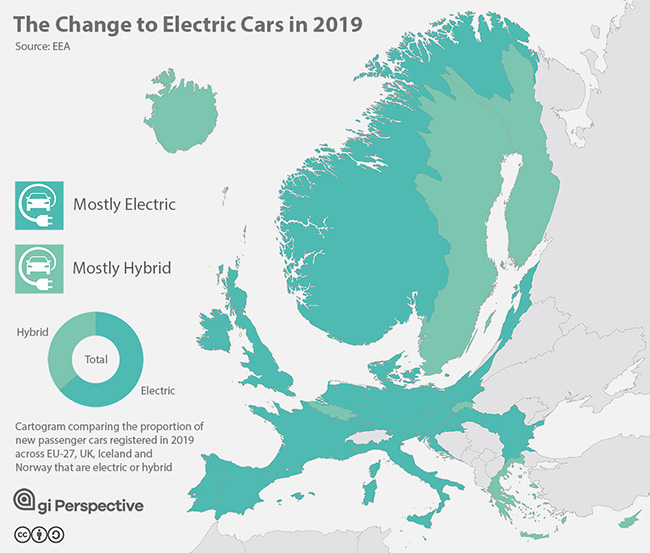On the 18th November 2020, Boris Johnson announced that the UK Government was bringing forward a ban on sales of petrol and diesel cars to the year 2030. At the same time, billions of pounds have been promised for a ‘green industrial revolution’, including investment in nuclear power and wind energy. While this is a bold step in sustainability and combating climate change, we’ve of course been wondering what the prospects are, of a rollout of such ambition.
How things have gone so far
We thought we would first have a look at how the rest of Europe is getting along with the switch to electric cars. We began by first sourcing data from the European Environment Agency (EEA) based on the monitoring of CO2 emissions from passenger cars – Regulation (EU) 2019/631. Data was available for the EU 27 member states, UK, Iceland and Norway for the year 2019.

We created a cartogram with GIS mapping data, where countries are resized according to a value. We could have represented the total sales of electric and hybrid cars, however due to the differences in population and car sales between countries, a meaningful pattern was not discernible. So instead, we resized countries according to the proportion of total car sales that were electric and hybrid from all fuel types, and this produced some surprising results.
Norway
Norway stands out proud on the cartogram as the European country that has really embraced the electric car revolution, with over half of new cars sold being either electric or hybrid. An electric car is only as clean as your electricity source, and Norway has one of the greenest, with much of the country’s electricity coming from renewable sources such as hydro power. The government has also introduced incentives for electric cars such as the removal of sales tax and drivers able to use bus lanes.
Greece
Greece sold less than 500 electric or hybrid cars in 2019 (0.4% of total car sales), but in June 2020, the government also introduced tax incentives. It has also promised to shut all but one of its coal-fired electricity plants by 2023.
United Kingdom
Meanwhile, what does it look like here at home? The UK sold slightly more electric than hybrid cars in 2019, a trend that is surely to continue. The UK’s total electric and hybrid car sales were around 3% of the total fleet. That is roughly in line with France and Germany.
Norway’s sales figures show that although this newer and more ambitious UK target to ban sales of petrol and diesel cars by 2030 can seem optimistic, it’s nowhere near improbable, with the right factors in place. Electric car sales can be accelerated as long as it is in line with government sales incentives and continuing increased investment in green energy.
Comments are closed here.